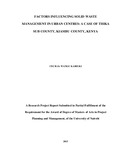| dc.description.abstract | The purpose of the study was to investigate the factors influencing solid waste
management in urban Centers. The study used Thika Sub-County as a case. The Study
aimed at achieving the following specific objectives: To identify the influence of public
and private partnerships on solid waste management practices in Thika Sub-County, to
determine the influence of public training on solid waste management practices in Thika
Sub-County, to assess the influence of institutional framework on solid waste management
costs in Thika Sub-County and to identify the influence of the enforcement of county
by-laws on solid waste management and environmental preservation in Thika Sub-County.
The study adopted descriptive survey research design using both qualitative and
quantitative research paradigms. The target population for this study constituted 2607
respondents of biashara location and it had a sample size of 271 respondents. The Data
Collection Instrument was a questionnaire that was self-administered. The data was
analyzed using descriptive statistics namely Frequencies, percentages and presented by use
of tables. The study concludes that; Garbage collection was not up to household‟
expectations. These findings concurs with Kazungu (2010) study that the lack of financial
and physical capacity by government agencies and other players involved in waste
collection is to blame for ineffective and inefficient waste management practices in
developing countries. Respondents were for the opinion that garbage collector was able to
cope with volumes of garbage; while just a few had contrary opinion that collector did not
cope with the garbage volumes. Half of the respondents were for the opinion that the area
was well served by garbage collectors, while the other half indicated that the area was not
well served by the garbage collectors. Garbage collection companies should increase the
number of collectors to ease collection, the number of vehicles should also be increased to
aid the garbage collection, and respondents further suggested that the bins at points of
collection should be placed at the strategic points and finally town council planners to put
in consideration the population size of the area. Thika sub-county needs to improve
garbage collection system by providing man power, enough vehicles to ease garbage
collection.. Services of garbage collectors were good in provision of collection bins and
providing enough collection polythene bags. However services of garbage collectors being
fair in provision of adequate work force, provision of enough collection vehicles, provision
of enough equipment and in consistent in collection. Kiambu County Government Act and
by extension most of the County By-Laws are traditional in nature and therefore not
consistent with Waste Management regulations 2006.The study recommends that; The
study recommends that Kiambu County should provide financial and physical capacity
county and sub-county agencies and other players involved in waste collection for
effective and efficient waste management practices in county. The study recommends that
Thika town council needs to improve garbage collection system. The Kiambu County
Government Act and by extension sub-County By-Laws should be modernized in nature
and in order to be consistent with Waste Management regulations 2006. | en_US |

